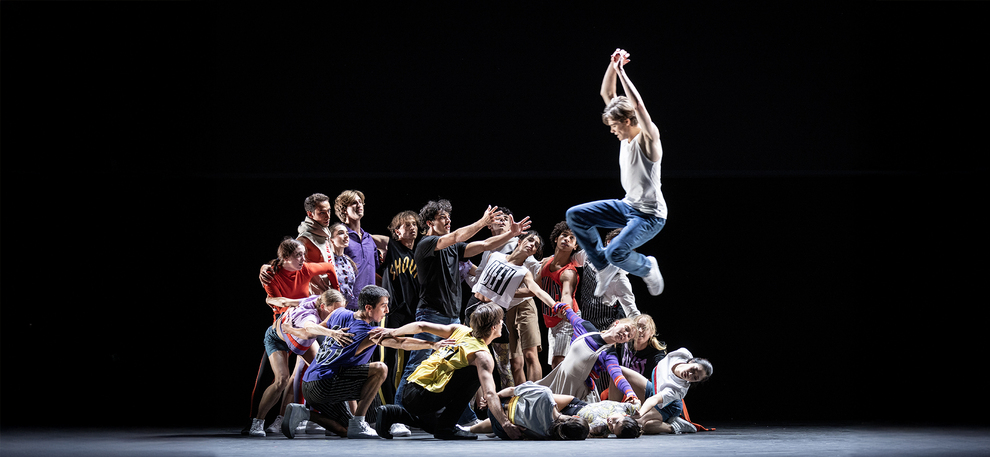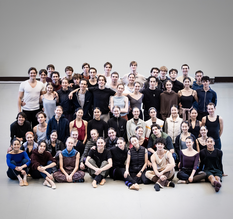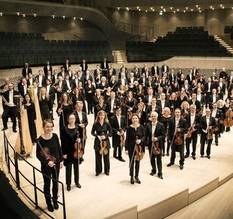


Mixed Bill with works by Pina Bausch, Hans van Manen, Demis Volpi and Justin Peck | THE TIMES ARE RACING

Ensemble
Hamburg Ballett
Hamburg is and has always been a city of dance, with the first ballet performances dating back as early as 1765. In 1963, the leading ensembles of the world, including the New York City Ballet and the London Royal Ballet, performed at the Hamburg State Opera. Just ten years later, a unique ballet history began in 1973 when the then 34-year-old John Neumeier was appointed as Ballet Director. For 51 years, Neumeier would lead the Hamburg company, later also as its Artistic Director, bringing it to worldwide acclaim and making it what it is today: the internationally renowned Hamburg Ballet. Beginning in August 2024, Demis Volpi will be taking over as the new Artistic Director of the 61-member ensemble.
The Hamburg Ballet is inseparably linked to the rich repertory of choreographies by John Neumeier, which often address literary, historical, or religious themes. The ensemble has gained fame far beyond the borders of the Hanseatic city through numerous guest performances, making it Germany’s flagship ballet company. In his first year as the Artistic Director, Demis Volpi will expand the repertoire by presenting works of Pina Bausch, Aszure Barton, William Forsythe and Justin Peck that have never yet been seen in Hamburg. Three of Volpi's own works will also be featured.
In the 2024/25 season, the Hamburg Ballet will present more than 80 performances on the stage of the Hamburg State Opera, in addition to guest appearances in Baden-Baden, Germany, and other European cities. The tradition of lecture demonstrations (Ballett-Werkstatt), providing the audience with fascinating insights into the creative and rehearsal work of a ballet ensemble, will continue under Demis Volpi. The current season marks the 50th anniversary of the dance festival "Hamburg Ballet Days" and, consequently, the 50th edition of the Nijinsky Gala, featuring celebrated stars from around the world alongside the Hamburg ensemble.
The School of the Hamburg Ballet, founded by John Neumeier in 1978, has become an integral part of the company and is housed in the Ballet Center in Hamburg Hamm, including its affiliated boarding school. A significant number of today's ensemble received their training at the ballet school.

Conductor
Vitali Alekseenok
Conductor
Vitali Alekseenok fascinates with his pervading musicality and well-rounded interpretations, as well as his open and at the same time profound personality as one of the most exciting talents of the young generation of conductors.
He entered the spotlight of international attention in 2021 with first place at the Arturo Toscanini Conducting Competition in Parma, where he also received the Audience Award and the prize for the best performance of a Verdi opera, among other prizes.
After having been Kapellmeister since November 2022, Alekseenok became Chief Conductor at the beginning of the 2024/25 season.
He also gave his debut at the Teatro alla Scala with the world premiere of the opera "Il Piccolo Principe" in 2022/23, along with having concerts at the Beethoven Festival in Bonn, Rossini Festival in Pesaro, Ludwigsburg Festival, and with Klangforum Wien. In December 2022 Alekseenok was named the Principal Guest Conductor at Teatro Massimo Bellini.
In previous seasons he has conducted orchestras such as the MDR Radio Symphony Orchestra Leipzig, Orchestra of the Teatro Comunale di Bologna, Düsseldorfer Symphoniker, Staatskapelle Weimar, Lucerne Festival Strings, Toscanini Orchestra in Parma, Kyiv Symphony Orchestra, among others.
As an opera conductor, Vitali Alekseenok conducted the first Ukrainian performance of Wagner's "Tristan and Isolde" at the National Opera of Ukraine in the Autumn of 2021. As an assistant and conductor, has also worked at the Bavarian State Opera in Munich, Gran Teatre del Liceu in Barcelona, Graz Opera, Odessa National Opera House, Deutsches National Theater Weimar, and Opera Varna. In 2018 he conducted a new production of Mozart's opera "Don Giovanni" in the Ukrainian military region Severodonetsk as a part of the Music and Dialogue project.
Alekseenok is the founder and artistic director of the ensemble paradigme, which performs 20th and 21st-century works, as well as world premieres by currently active composers.
After his studies in St Petersburg (Prof. Alexander Alekseev) and Weimar (Prof. Nicolas Pasquet, Ekhart Wycik, Gunter Kahlert), Alekseenok took part in masterclasses with Bernard Haitink, Fabio Luisi, Jorma Panula, Ricardo Muti, among others. He has also worked with Vladimir Jurowski, Oksana Lyniv, Lothar Zagrosek, and Maurizio Barbaccini.
Vitali Alekseenok is active in various pedagogical fields, including conducting numerous youth orchestras in Germany, Italy, Poland and Ukraine and lecturing at the universities of Munich, Berlin and Frankfurt am Main.
He is the author of the book "The White Days of Minsk" (S. Fischer Frankfurt, 2021) and has written articles and essays for Tagesspiegel, Neue Rundschau Frankfurt, Religion & Gesellschaft Zürich, among others.
In June 2021 Alekseenok was appointed as the new Artistic Director of the Kharkiv Music Festival in Ukraine which has held numerous concerts in bomb shelters, subways, and hospitals in Kharkiv during the war.
photo: Elza Zhrerebchuk

Orchestra
Philharmonisches Staatsorchester Hamburg
Orchestra
The Philharmonic State Orchestra is Hamburg’s largest and oldest orchestra, looking back on many years of musical history. When the “Philharmonic Orchestra” and the “Orchestra of the Hamburg Municipal Theatre” merged in 1934, two tradition-steeped orchestras combined. Philharmonic concerts have been performed in Hamburg since 1828, artists such as Clara Schumann, Franz Liszt and Johannes Brahms being regular guests of the Philharmonic Society. The history of the opera company goes back even further: Hamburg has been home to musical theatre since 1678, even if a regular opera or theatre orchestra was only formed later. To this day, the Philharmonic State Orchestra has embodied the sound of the Hansa City, a concert and opera orchestra in one.
During its long history, the orchestra encountered great artist personalities. Apart from composers of the 18th, 19th and 20th centuries, such as Telemann, Tchaikovsky, Strauss, Mahler, Prokofiev and Stravinsky, since the 20th century chief conductors such as Karl Muck, Joseph Keilberth, Eugen Jochum, Wolfgang Sawallisch, Horst Stein, Aldo Ceccato, Christoph von Dohnányi, Gerd Albrecht, Ingo Metzmacher and Simone Young have shaped the orchestra’s sound. Renowned conductors of the pre-war era such as Otto Klemperer, Wilhelm Furtwängler, Bruno Walter, Karl Böhm and Hans Schmidt-Isserstedt gave brilliant performances, as did outstanding conductors of our times: suffice it to mention Christian Thielemann, Semyon Bychkov, Kirill Petrenko, Adam Fischer and Sir Roger Norrington.
Starting with the 2015/2016 season, Kent Nagano has taken on the position of Hamburg’s General Music Director and Chief Conductor of the Philharmonic State Orchestra and the Hamburg State Opera and since June 2023 also its honorary conductor. In his first season Kent Nagano initiated a new project, the Philharmonic Academy, focusing on experimentation and chamber music. In 2016, Nagano and the Philharmonic toured South America, followed by concert tours to Spain and Japan in 2019, and in the spring of 2023, the Philharmonic State Orchestra made its debut at New York's Carnegie Hall under his direction, which was acclaimed by audiences and the press. Since 2017 Kent Nagano and the Philharmonic State Orchestra have continued the traditional Philharmonic Concerts at the new Elbphilharmonie, for which they commissioned Jörg Widmann to compose the oratorio ARCHE, which was given its world premiere during the hall’s opening festivities. The concert recording has been released by ECM, for which Widmann received the OPUS KLASSIK as Composer of the Year 2019, and ARCHE was performed again in 2023 to great acclaim.
The Philharmonic State Orchestra offers approximately 35 concerts per season and performs more than 240 performances per year at the Hamburg State Opera and the Hamburg Ballet John Neumeier, making it Hamburg’s busiest orchestra. The stylistic bandwidth covered by the 140 musicians, ranging from historically informed performance practice to contemporary works and including concert, opera and ballet repertoire, is unique throughout Germany. Chamber Music has a long tradition at the Philharmonic State Orchestra: what began in 1929 with a concert series for chamber orchestra has been continued since 1968 by a series of chamber music only.
In 2008 Simone Young and the Philharmonic State Orchestra won the Brahms Award of the Schleswig-Holstein Brahms Society. The orchestra has recorded the complete Ring by Wagner as well as the complete symphonies of Johannes Brahms and Anton Bruckner – the latter in the rarely-performed original versions – as well as works by Mahler, Hindemith and Berg, and has released DVDs of opera and ballet productions by Hosokawa, Offenbach, Reimann, Auerbach, J.S. Bach, Puccini, Poulenc and Weber.
The members of the Philharmonic State Orchestra feel equally beholden to Hamburg’s musical tradition and responsible for the city’s artistic future. Since 1978 the musicians have been participating in education programmes in Hamburg’s schools. Today, the orchestra maintains a broad education programme, including school and kindergarten visits, patronage for music projects, introductory events for children and family concerts. The orchestra’s own academy prepares young musicians for their professional careers. The Philharmonic’s musicians thereby make an equally enjoyable and valuable contribution to tomorrow’s music education in the music metropolis of Hamburg.
photo: Foto: Felix Broede
